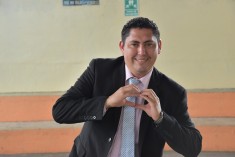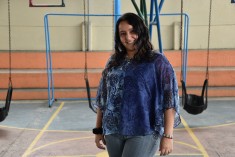
A significant body of research points to the positive effects of implementing restorative practices in schools for student wellbeing. In Ecuador, schools use the methodology to mitigate the relatively high levels of peer-on-peer violence in educational settings. Three counsellors testify to the long-lasting positive effects of restorative practices.
Vulnerable students in Ecuador
A 2015 study by UNICEF, World Vision and Ecuador’s Ministry of Education (MINEDUC) revealed that one in five 11-to-18-year-old students in Ecuador suffer school-related violence such as bullying. Since then, MINEDUC has received over 4,000 complaints of sexual violence against minors. Of these 4,000+ cases, 45 percent occured in an educational setting. In Ecuador, there is an above average number of vulnerable students in secondary technical education.
Since 2011, VVOB has been working hand-in-hand with MINEDUC to put student wellbeing at the heart of secondary technical schools’ pedagogical projects through capacity development of teachers and school leaders. And since 2016, VVOB has been supporting MINEDUC with the implementation of restorative practices in Ecuador’s secondary technical schools as a way to prevent and handle conflicts in schools of any nature, and to re-engage students after a conflict occurred.
Creating safe environments to reflect together
‘Restorative practices’ is an emerging social science that studies the different avenues possible to repair and strengthen relationships between individuals and within communities. The end goal is to build healthy communities, increase social capital, decrease crime and antisocial behaviour, repair harm and restore relationships.
The video below tells you more.
A significant body of research points to the effectiveness of restorative practices in school settings in terms of reducing suspension rates, increasing student attendance and improving the school climate and teacher-student relationships. When a student is confronted with his or her wrongdoing by the school staff, restorative practices create a safe space for them to reflect, decide how they can repair the harm they have done and how to avoid doing so again, all the while contributing to a warm school community. Restorative practices can be used both preventively and reactively.
Building and/or repairing relationships can be done in a larger group – a restorative circle – where the views and wishes of all involved are considered and where all work towards a resolution in a calm and positive way. In more serious or complex cases, a restorative meeting can be organised between the victim, the aggressor and, if appropriate, the families.
Capacitating those with the widest reach
In its support to MINEDUC in implementing restorative practices in Ecuador’s secondary technical schools, VVOB’s first point of contact are the local DECE, local government staff from the Department of Student Counselling (Departamento de Consejería Estudiantil).
Local DECE are either:
- institutional DECE: appointed to a large school and partly responsible for on-the-job training and coaching of teachers and school leaders in the area of student wellbeing (schools with less than 450 students do not have an on-site DECE),
- or district-level DECE: appointed to a district with a multitude of schools and responsible for following up on and coaching institutional DECE.
VVOB trains and coaches Ecuador’s 140 district-level DECE in restorative practices, so they can do the same for the institutional DECE, teachers and school leaders under their supervision. In doing so, VVOB ensures restorative practices are known, valued and implemented by as many educators as possible.
Read on for some inspiring personal experiences of three district-level DECE working on restorative practices with schools in the province of Santo Domingo in Ecuador.
Jenny Lopez
“In one of the schools in my district, two students claimed to have been sexually harassed by a teacher. The school organised a restorative circle with the school community, and that’s how seven more cases were identified. Now, it’s a legal issue. Restorative circles create a safe space for students to come forward. They feel heard.”
“Teenage pregnancy is a serious challenge in secondary technical schools. There was a school where nineteen girls became pregnant in just one year. That’s when it was decided to organise a restorative circle for prevention; the next year ‘only’ six girls became pregnant.”

Diego Pantoja
“There were two students who got in a very serious fistfight. A bystander filmed the incident and put it on Facebook. I organised a restorative meeting with the two students in question, their immediate friends, their parents and other victimised students. It was a very respectful undertaking and had a great result: the two students are now in charge of an awareness raising campaign about bullying in schools.”
“My goal is to build a real community in my schools. Restorative circles, either preventive ones or in response to an incident, contribute greatly to that goal.”

Silvia Pinos
“There was a case of a class where bullying was rampant. The school staff organised a preventive restorative circle to not only identify the wrongdoers and the victims, but most importantly to find solutions and compromises together with all those involved. The school is so convinced of the benefits of the approach, that they are now using it to teach very young children how to speak up for themselves.”






